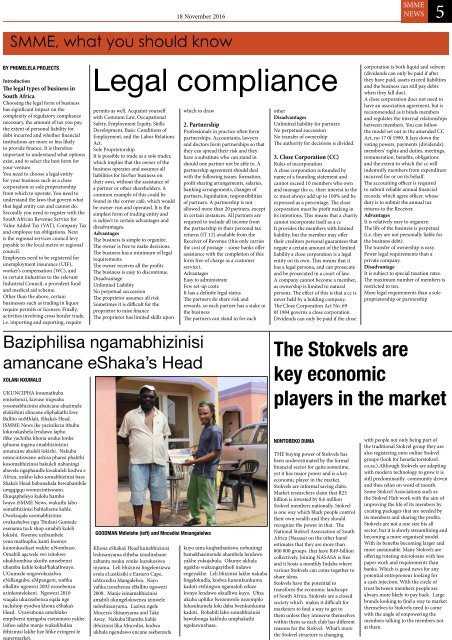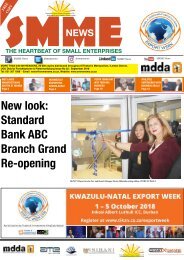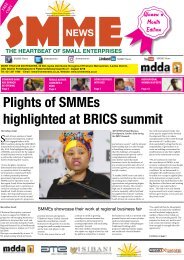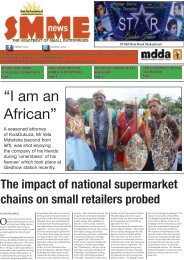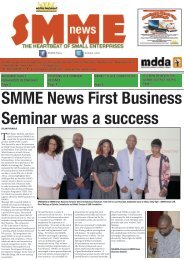Create successful ePaper yourself
Turn your PDF publications into a flip-book with our unique Google optimized e-Paper software.
18 November <strong>2016</strong><br />
<strong>SMME</strong>, what you should know<br />
<strong>SMME</strong><br />
<strong>NEWS</strong><br />
5<br />
By Phumelela Projects<br />
Introduction<br />
The legal types of business in<br />
South Africa<br />
Choosing the legal form of business<br />
has significant impact on the<br />
complexity of regulatory compliance<br />
necessary, the amount of tax you pay,<br />
the extent of personal liability for<br />
debt incurred and whether financial<br />
institutions are more or less likely<br />
to provide finance. It is therefore<br />
important to understand what options<br />
exist, and to select the best form for<br />
your venture.<br />
You need to choose a legal entity<br />
for your business such as a close<br />
corporation or sole proprietorship<br />
from which to operate. You need to<br />
understand the laws that govern what<br />
that legal entity can and cannot do.<br />
Secondly you need to register with the<br />
South African Revenue Service for<br />
Value Added Tax (VAT), Company Tax<br />
and employee tax obligations. Next<br />
is the regional services council levy<br />
payable to the local metro or regional<br />
council.<br />
Employees need to be registered for<br />
unemployment insurance (UIF),<br />
worker’s compensation (WC), and<br />
in certain industries to the relevant<br />
Industrial Council, a provident fund<br />
and medical aid scheme.<br />
Other than the above, certain<br />
businesses such as trading in liquor<br />
require permits or licenses. Finally,<br />
activities involving cross border trade,<br />
i.e. importing and exporting, require<br />
XOLANI NXUMALO<br />
UKUNCIPHA kwamathuba<br />
emisebenzi, kuvuse inqwaba<br />
yosomabhizinisi abancane abazimele<br />
elokishini elincane eliphakathi kwe<br />
Ballito noMhlali, iShaka’s Head.<br />
I<strong>SMME</strong> News ike yazinikeza ithuba<br />
lokuvakashela lendawo lapho<br />
ifike yachitha khona usuku lonke<br />
iphuma ingena emabhizinisini<br />
amancane akuleli lokishi. Nakuba<br />
umncintiswano ushisa phansi phakthi<br />
kosomabhizinisi bakuleli nabaningi<br />
abavela ngaphandle kwakuleli kodwa e<br />
Africa, nokho labo somabhizinisi base<br />
Shaka’s Head babonakala bewubambile<br />
umgqigqo womncintiswano.<br />
Ekuqapheleyo kulolu hambo<br />
lwayo i<strong>SMME</strong> News, wukuthi labo<br />
somabhizinisi bahlalisene kahle.<br />
Owokuqala usomabhizinisi<br />
ovakashelwe ngu Thulani Gumede<br />
osenama tuck shop amabili kuleli<br />
lokishi. Kwenye uzibambele<br />
yena mathupha, kanti kwenye<br />
kunonkosikazi wakhe uNombuso.<br />
Omabili agcwele swi isitokwe<br />
okukhombisa ukuthi umsebenzi<br />
uhamba kahle kokaPhakathwayo.<br />
UGumede ongowokuzalwa<br />
eNdlangubo, eMpangeni, wafika<br />
eBallito ngowezi 2002 ezosebenza<br />
ezinkontelekeni. Ngowezi 2010<br />
waqala ukuzisebenza eqala nge<br />
tuckshop eyodwa khona eShaka’s<br />
Head. Uyawubona umehluko<br />
empilweni njengoba esenemoto yakhe.<br />
Isifiso sakhe manje wukukhulisa<br />
ibhizinisi lakhe lize lifike ezingeni le<br />
supermarket.<br />
Legal compliance<br />
permits as well. Acquaint yourself<br />
with Common Law, Occupational<br />
Safety, Employment Equity, Skills<br />
Development, Basic Conditions of<br />
Employment, and the Labor Relations<br />
Act.<br />
Sole Proprietorship<br />
It is possible to trade as a sole trader,<br />
which implies that the owner of the<br />
business operates and assumes all<br />
liabilities for his/her business on<br />
their own, without the assistance of<br />
a partner or other shareholders. A<br />
common example of this could be<br />
found in the corner café, which would<br />
be owner-run and operated. It is the<br />
simplest form of trading entity and<br />
is subject to certain advantages and<br />
disadvantages.<br />
Advantages<br />
The business is simple to organize.<br />
The owner is free to make decisions.<br />
The business has a minimum of legal<br />
requirements<br />
The owner receives all the profits<br />
The business is easy to discontinue.<br />
Disadvantage<br />
Unlimited Liability<br />
No perpetual succession<br />
The proprietor assumes all risk<br />
Sometimes it is difficult for the<br />
proprietor to raise finance<br />
The proprietor has limited skills upon<br />
Khona eShaka’s Head kunebhizinisi<br />
leshisanyama eliheha izindimbane<br />
zabantu nsuku zonke kuzokosiwa<br />
inyama. Leli bhizinisi lingelensizwa<br />
evela eLusikisiki e Eastern Cape,<br />
uMncedisi Mangalelwa. Nayo<br />
yafika izosebenza eBallito ngowezi<br />
2008. Manje isinamabhizinisi<br />
amabili okungelokwenza izinwele<br />
neleshisanyama. Laziwa ngele<br />
Mncera’s Shisanyama and Take<br />
Away. Nakuba lihamba kahle<br />
ibhizinisi lika Mncedisi, kodwa<br />
ukhala ngendawo encane asebenzela<br />
which to draw<br />
Baziphilisa ngamabhizinisi<br />
amancane eShaka’s Head<br />
Goodman Mdletshe (left) and Mncedisi Mmangalelwa<br />
2. Partnership<br />
Professionals in practice often form<br />
partnerships. Accountants, lawyers<br />
and doctors form partnerships so that<br />
they can spread their risk and they<br />
have a substitute who can stand in<br />
should one partner not be able to. A<br />
partnership agreement should deal<br />
with the following issues: formation,<br />
profit sharing arrangements, salaries,<br />
banking arrangements, changes of<br />
partners, liquidation, responsibilities<br />
of partners. A partnership is not<br />
allowed more than 20 partners, except<br />
in certain instances. All partners are<br />
required to include all income from<br />
the partnership in their personal tax<br />
returns (IT 12) available from the<br />
Receiver of Revenue (this only carries<br />
the cost of postage – some banks offer<br />
assistance with the completion of this<br />
form free of charge as a customer<br />
service).<br />
Advantages<br />
Easy to administrate<br />
Few set-up costs<br />
It has a definite legal status<br />
The partners do share risk and<br />
rewards, so each partner has a stake in<br />
the business<br />
The partners can stand in for each<br />
kuyo uma kuqhathaniswa nobuningi<br />
bamakhasimende ahambela lendawo<br />
yakhe yokujabula. Okunye akhala<br />
ngakho wukungayitholi indawo<br />
engeyakhe. Leli bhizinisi lakhe nakuba<br />
lingelokudla, kodwa kunenkunkuma<br />
kadoti etshingwa ngamaloli eduze<br />
kwayo lendawo okudliwa kuyo. Ufisa<br />
ukuba uphiko lwezemvelo nezempilo<br />
lulusukumela lolu daba lwenkunkuma<br />
kadoti. Bobabili labo somabhizinisi<br />
bawubonga kakhulu umphakathi<br />
ngokuwuxhasa.<br />
other<br />
Disadvantages<br />
Unlimited liability for partners<br />
No perpetual succession<br />
No transfer of ownership<br />
The authority for decisions is divided.<br />
3. Close Corporation (CC)<br />
Rules of incorporation<br />
A close corporation is founded by<br />
name of a founding statement and<br />
cannot exceed 10 members who own<br />
and manage the cc. their interest in the<br />
cc must always add up to 100% and be<br />
expressed as a percentage. The close<br />
corporation must be profit making in<br />
its intentions. This means that a charity<br />
cannot incorporate itself as a cc<br />
It provides the members with limited<br />
liability, but the member may offer<br />
their creditors personal guarantees that<br />
negate a certain amount of the limited<br />
liability a close corporation is a legal<br />
entity on its own. This means that it<br />
has a legal persona, and can prosecute<br />
and be prosecuted in a court of law.<br />
A company cannot become a member,<br />
as ownership is limited to natural<br />
persons. The effect of this is that a cc is<br />
never held by a holding company.<br />
The Close Corporation Act No. 69<br />
0f 1984 governs a close corporation.<br />
Dividends can only be paid if the close<br />
NONTOBEKO DUMA<br />
THE buying power of Stokvels has<br />
been underestimated by the formal<br />
financial sector for quite sometime,<br />
yet it has major power and is a key<br />
economic player in the market.<br />
Stokvels are informal saving clubs.<br />
Market researchers claim that R25<br />
billion is invested by 8,6 million<br />
Stokvel members nationally. Stokvel<br />
is one way which black people control<br />
their own wealth and they should<br />
recognize the power in that. The<br />
National Stokvel Association of South<br />
Africa (Nasasa) on the other hand<br />
estimates that they are more than<br />
800 000 groups that have R49-billion<br />
collectively. Joining NASASA is free<br />
and it hosts a monthly Indaba where<br />
various Stokvels can come together to<br />
share ideas.<br />
Stokvels have the potential to<br />
transform the economic landscape<br />
of South Africa. Stokvels are a closed<br />
society which makes it difficult for<br />
marketers to find a way to get to<br />
them unless they immerse themselves<br />
within them as each club has different<br />
reasons for the Stokvel. What’s more<br />
the Stokvel structure is changing<br />
corporation is both liquid and solvent<br />
(dividends can only be paid if after<br />
they have paid, assets exceed liabilities<br />
and the business can still pay debts<br />
when they fall due).<br />
A close corporation does not need to<br />
have an association agreement, but is<br />
recommended as it binds members<br />
and regulates the internal relationships<br />
between members. You can follow<br />
the model set out in the amended CC<br />
Act, no 17 0f 1990. It lays down the<br />
voting powers, payments (dividends),<br />
members’ rights and duties, meetings,<br />
remuneration, benefits, obligations<br />
and the extent to which the cc will<br />
indemnify members from expenditure<br />
incurred for or on its behalf.<br />
The accounting officer is required<br />
to submit reliable annual financial<br />
records, which agree officer, whose<br />
duty is to submit the annual tax<br />
returns to the Receiver.<br />
Advantages<br />
It is relatively easy to organize.<br />
The life of the business is perpetual<br />
(i.e. they are not personally liable for<br />
the business debt).<br />
The transfer of ownership is easy.<br />
Fewer legal requirements than a<br />
private company.<br />
Disadvantage<br />
It is subject to special taxation rates.<br />
The maximum number of members is<br />
restricted to ten.<br />
More legal requirements than a sole<br />
proprietorship or partnership<br />
The Stokvels are<br />
key economic<br />
players in the market<br />
with people not only being part of<br />
the traditional Stokvel group they are<br />
also registering onto online Stokvel<br />
groups (look for benefactorstokvel.<br />
co.za.).Although Stokvels are adapting<br />
with modern technology to grow it is<br />
still predominantly community driven<br />
and thus relies on word of mouth.<br />
Some Stokvel Associations such as<br />
the Stokvel Hub work with the aim of<br />
improving the life of its members by<br />
creating packages that are needed by<br />
its members and sharing the profits.<br />
Stokvels are not a one size fits all<br />
sector, but it is slowly streamlining and<br />
becoming a more organised model.<br />
With its benefits becoming larger and<br />
more sustainable. Many Stokvels are<br />
offering rotating microloans with less<br />
paper work and requirements than<br />
banks. Which is good news for any<br />
potential entrepreneur looking for<br />
a cash injection. With the circle of<br />
trust between members people are<br />
always more likely to pay back. Large<br />
brands looking to find a way to market<br />
themselves to Stokvels need to come<br />
with the angle of empowering the<br />
members talking to the members not<br />
at them.


